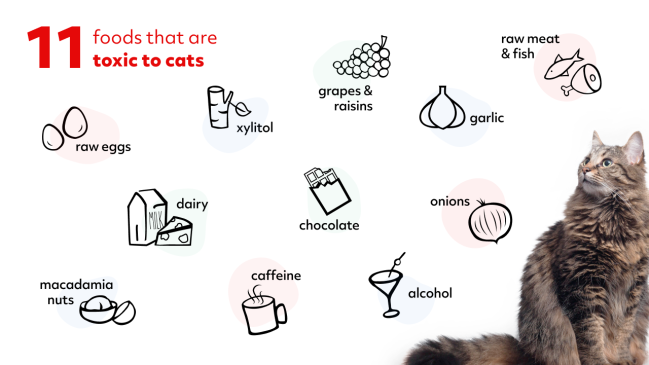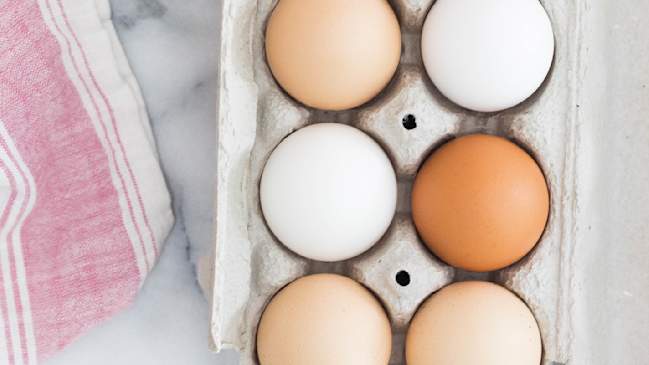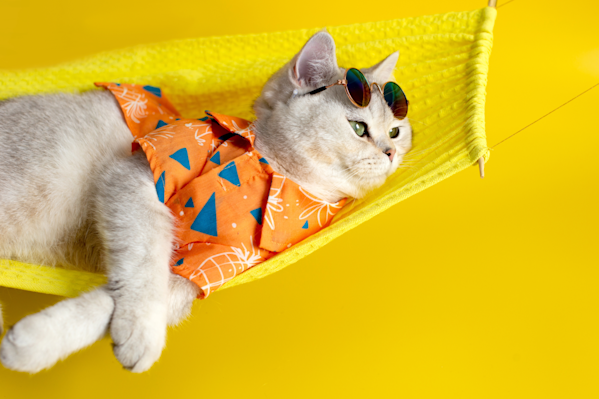Anytime I find myself in the kitchen looking for a snack (which is, admittedly, too often), I also find my cat Paul darting dangerously under my feet. Yes, shocker, he's real affectionate whenever there's food in the equation. And while I'm not one to toss him scraps, he is one to vacuum the floor of anything edible (and sometimes inedible) anyway. Of course, my immediate concern is whether these human foods are toxic to cats!
So if you're wondering what not to feed your cat, we've put together a list of both foods that are toxic and foods that are dangerous for cats.
Talk To A Vet If Your Cat Eats Something Toxic
If your cat has ingested any of these dangerous foods, talk to a vet. Whether or not your cat is in danger will depend on a few different variables like what the food is, how much your cat eats, and what your cats weighs. If you're worried or your cat is showing any symptoms like vomit or diarrhea, speak with a vet now online.
Human Foods That Are Toxic To Cats

1. Onions
Whether they're powdered, raw, or cooked, onions are toxic to cats. Onion toxicity can lead to hemolysis, or a breakdown of red blood cells in cats. If a cat eats 1 gram per 5 pounds of body weight, they may experience toxicity. Talk to a vet if your cat has ingested a large amount — and even a small amount if it's accompanied by panting, vomiting, blood in the urine, or a change in behavior.
2. Garlic
Also in the allium family, garlic is toxic to your cat (along with chives and leeks). Garlic is considered to be five times more toxic to cats than onions. Garlic poisoning can lead to gastroenteritis as well as a breakdown of red blood cells, which can affect oxygen levels and your cat's ability to heal.
3. Raw Meat & Fish
While raw diets have become more popular with pet parents, there are serious health risks involved. Raw meat can contain bacteria and parasites that are harmful to your cat's health, which can ultimately be passed to humans. There's also an enzyme in raw fish that destroys thiamine, which is a vitamin your cat needs to survive.
If you do prefer to feed your cat raw food, speak with a veterinarian to make sure you're taking all the right precautions and feeding your cat a balanced meal.
4. Raw Eggs

Like raw meat, raw eggs have become a popular staple in raw feeding diets. While raw eggs are not toxic, they can carry dangerous bacteria like Salmonella. There is very little nutritional difference between a raw and cooked egg and one is infinitely safer. There also happens to be a protein in raw eggs called avidine that negatively affects your cat's skin and coat condition.
5. Chocolate
Although it's more famously toxic to dogs (who are more likely to seek it out), chocolate is still dangerous to cats. It contains theobromine, which can't be metabolized by cats and eating too much could lead to liver failure. The darker the chocolate, the more dangerous it is.
6. Caffeine
While a lick or two of tea or coffee is unlikely to be toxic to your cat, eating a tea bag or chewing on coffee grounds might affect your cat negatively. The ingredient theobromine is also present in caffeine, so if your cat is experiencing any poisoning symptoms, talk to a vet.
7. Grapes & Raisins
While grapes and raisins may be healthy for humans, they can be very toxic for cats. This is especially important to note if you're the type of household to leave grapes out. Eating grapes can lead to kidney damage or even failure.
8. Dairy
While cats might famously be associated with a bowl of milk (or the cat getting the cream), most cats have trouble digesting lactose. While it may not be toxic, many cats can have adverse digestive reactions to consuming dairy, like vomiting and diarrhea.
9. Macadamia Nuts
Macadamia nuts can cause lethargy, vomiting, and tremors in cats. While it's not known exactly why these nuts cause problems with cats, ingesting too much can cause a toxic reaction.
10. Xylitol
Xylitol, which can be found in gum, toothpaste, candy, and ice cream, is toxic to cats. If you're brushing your cat's teeth (and you should for their dental health), make sure you use a cat-safe toothpaste.
11. Alcohol

Be careful about leaving your happy hour drinks around because alcohol is toxic to cats. Ethanol poisoning can cause problems with your cat's central nervous system. Because of their size and weight, a small amount of alcohol can do damage. If your cat has ingested alcohol, talk to a vet immediately.
